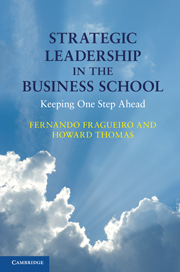Book contents
- Frontmatter
- Contents
- List of figures
- List of tables
- Preface
- Acknowledgements
- Introduction
- 1 The business school landscape: trends and dilemmas
- 2 Business schools as professional organisations (professional service firms)
- 3 The leadership process in business schools
- 4 Strategic leadership in practice: leading the strategic process in three top business schools
- 5 Strategic leadership in practice: the role of the dean
- 6 Learning from the trenches: personal reflections on deanship
- References
- Index
6 - Learning from the trenches: personal reflections on deanship
Published online by Cambridge University Press: 28 April 2011
- Frontmatter
- Contents
- List of figures
- List of tables
- Preface
- Acknowledgements
- Introduction
- 1 The business school landscape: trends and dilemmas
- 2 Business schools as professional organisations (professional service firms)
- 3 The leadership process in business schools
- 4 Strategic leadership in practice: leading the strategic process in three top business schools
- 5 Strategic leadership in practice: the role of the dean
- 6 Learning from the trenches: personal reflections on deanship
- References
- Index
Summary
INTRODUCTION
In this chapter, we hope to offer a much more personal contribution based on our experiences as deans of two very different business schools: Warwick Business School, where Howard Thomas was dean from 2000 to 2010, and IAE Business School, where Fernando Fragueiro was dean from 1995 to 2008. These institutions differ greatly not only because the former is located near the city of Coventry, in the heart of England, and the latter is situated in a Buenos Aires suburb, at Latin America's southernmost tip, but also as a result of their dramatically different outer environments – the United Kingdom and Argentina – and surrounding cultures. Furthermore, their individual inception processes were very dissimilar. While WBS was founded in the 1960s as part of a university embedded in a system characterised by state support and academic oversight, IAE was created in 1978 as a stand-alone institution with neither financial aid nor supervision from the public sector. Eventually IAE's independent status changed, as it became part of a newly created private university – Universidad Austral – in 1991, although it remained autonomous until 2000, when Universidad Austral was formally installed as IAE's parent institution. Incorporating IAE into Universidad Austral's governance structure was not an easy process, but it was successfully driven by both institutions' determination to complement and benefit each other.
- Type
- Chapter
- Information
- Strategic Leadership in the Business SchoolKeeping One Step Ahead, pp. 209 - 248Publisher: Cambridge University PressPrint publication year: 2011



